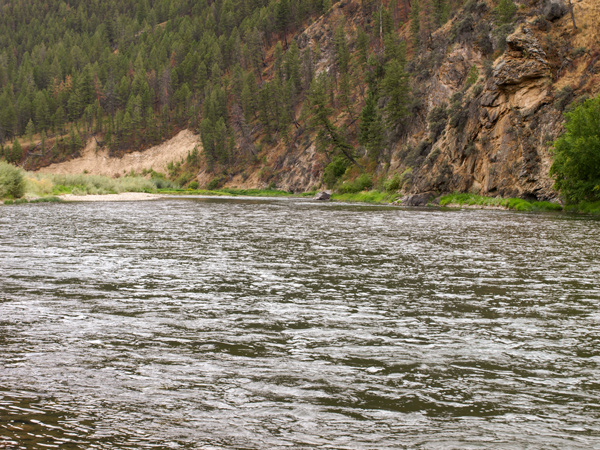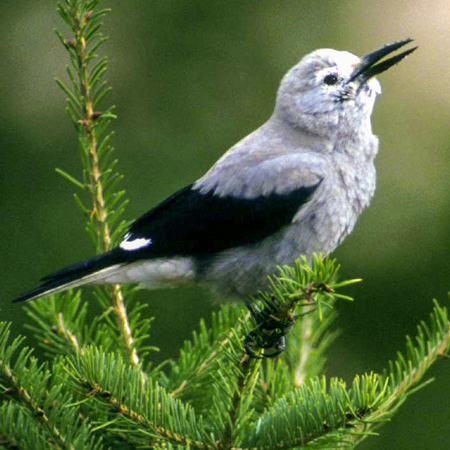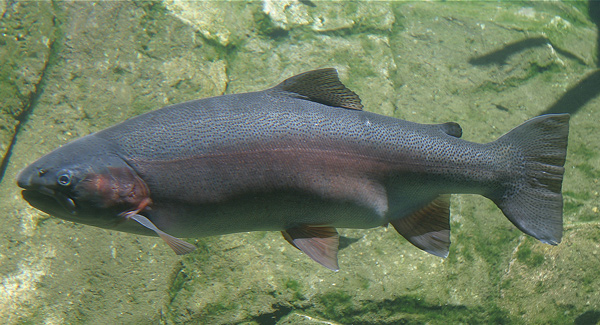Salmon River, ID and Fortunate Camp, MT Midday, Cameahwait’s band arrives at Fortunate Camp, and he and Lewis exchange food and horses. On the Salmon River, steep hills and mountains hem in Clark’s scouting party. Clark describes Clark’s Nutcracker, a bird new to science.
Salmon River
© 9 September 2008 by Kristopher K. Townsend. Permission to use granted under the Creative Commons Attribution-Share Alike 4.0 International license.
Riding After a Stolen Gun[1]Originally aired weekdays by Yellowstone Public Radio during the Bicentennial observance of 2003-2006. Narrated by Hal Hansen. Scripts by Whit Hansen and Ed Jacobson. Produced by Leni Holliman. © … Continue reading
Clark: Salmon River Canyons
Salmon River Hills
the rocks in maney places loose & Sliped from those mountains and is a bed of rugid loose white and dark brown loose rock for miles. the Indian horses pass over those Clifts hills Sids & rocks as fast as a man, the three horses with me do not detain me any on account of those dificuelties
—William Clark
Village on the North Fork
a Small river at the mouth of Which Several families of [Lemhi Shoshone] Indians were encamped and had Several Scaffolds of fish & buries drying we allarmed them verry much as they knew nothing of a white man being in their Countrey
—William Clark
Small Island Camp
proceeded down the [Salmon] river; but with a great deal of difficulty: the mountains being so close, steep and rocky. The river here is about 80 yards wide, and a continual rapid, but not deep. We went about 15 miles to day, and encamped on a small island, as there was no other level place near.
—William Clark
Clark’s Nutcracker
I Saw to day Bird of the wood pecker kind which fed on Pine burs its Bill and tale white the wings black every other part of a light brown, and about the Size of a robin.
—William Clark
Lewis: Shoshone Arrival
Drouillard’s Three Roots
Drewyer now returned to the place they had left their baggage and brought it with him to my camp. it consisted of several dressed and undressed skins; a couple of bags wove with the fingers of the bark of the silk-grass containing each about a bushel of dryed service berries some checkerry cakes and about a bushel of roots of three different kinds dryed and prepared for uce
—Meriwether Lewis
Mandan Squash and Beans
at 11 A. M. Charbono [Charbonneau] the Indian Woman [Sacagawea], Cameahwait and about 50 men with a number of women and children arrived . . . . I gave him a few dryed squashes which we had brought from the Mandans he had them boiled and declared them to be the best thing he had ever tasted except sugar, a small lump of which it seems his sister Sah-cah-gar Wea had given him.
—Meriwether Lewis
Dragging for Fish
late in the evening I made the men form a bush drag, and with it in about 2 hours they caught 528 very good fish, most of them large trout. among them I now for the first time saw ten or a douzen of a whte speceis of trout . . . . I distributed much the greater portion of the fish among the Indians.
—Meriwether Lewis
Dealings with the Shoshone
I purchased five good horses of them very reasonably, or at least for about the value of six dollars a peice in merchandize. the Indians are very orderly and do not croud about our camp nor attempt to disterb any article they see lying about. they borrow knives kettles &c from the men and always carefully return them.
—Meriwether Lewis
Gass: Shoshone Bread
The people of these three lodges have gathered a quantity of sunflower seed, and also of the lambs-quarter, which they pound and mix with service berries, and make of the composition a kind of bread; which appears capable of sustaining life for some time.
—Patrick Gass
Weather Diary
State of the Thermometer at rise
Weather at rise
Wind at rise
State of the Thermometer at 4 P.M. Weather at 4 P.M. Wind at 4 P.M. 22 [above 0] fair E. 70 [above 0] fair E. Snow yet appears on the summits of the mountains. the Indians arrive at 12 OC
—Meriwether Lewis[2]To assist the reader, the editor of this web page has omitted the date column and spelled out some abbreviations.
Notes
| ↑1 | Originally aired weekdays by Yellowstone Public Radio during the Bicentennial observance of 2003-2006. Narrated by Hal Hansen. Scripts by Whit Hansen and Ed Jacobson. Produced by Leni Holliman. © 2003 by Yellowstone Public Radio. |
|---|---|
| ↑2 | To assist the reader, the editor of this web page has omitted the date column and spelled out some abbreviations. |



